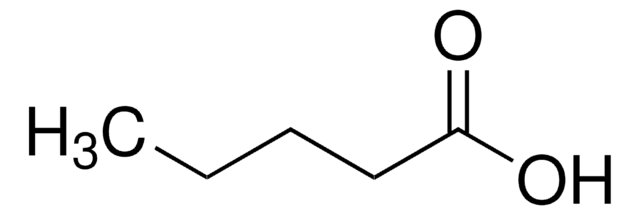94425
Propionic acid
analytical standard
Synonym(s):
Acid C3, Propanoic acid, Propanyl acid
About This Item
Recommended Products
grade
analytical standard
Quality Level
vapor density
2.55 (vs air)
vapor pressure
2.4 mmHg ( 20 °C)
Assay
≥99.5% (GC)
autoignition temp.
955 °F
shelf life
limited shelf life, expiry date on the label
expl. lim.
12.1 %
technique(s)
HPLC: suitable
gas chromatography (GC): suitable
refractive index
n20/D 1.386 (lit.)
n20/D 1.386
bp
141 °C (lit.)
mp
−24-−23 °C (lit.)
solubility
H2O: soluble
density
0.993 g/mL at 25 °C (lit.)
application(s)
cleaning products
cosmetics
environmental
flavors and fragrances
food and beverages
personal care
format
neat
SMILES string
CCC(O)=O
InChI
1S/C3H6O2/c1-2-3(4)5/h2H2,1H3,(H,4,5)
InChI key
XBDQKXXYIPTUBI-UHFFFAOYSA-N
Looking for similar products? Visit Product Comparison Guide
General description
Application
Recommended products
Signal Word
Danger
Hazard Statements
Precautionary Statements
Hazard Classifications
Eye Dam. 1 - Flam. Liq. 3 - Skin Corr. 1B - STOT SE 3
Target Organs
Respiratory system
Storage Class Code
3 - Flammable liquids
WGK
WGK 1
Flash Point(F)
129.2 °F - closed cup
Flash Point(C)
54 °C - closed cup
Personal Protective Equipment
Choose from one of the most recent versions:
Already Own This Product?
Find documentation for the products that you have recently purchased in the Document Library.
Customers Also Viewed
Our team of scientists has experience in all areas of research including Life Science, Material Science, Chemical Synthesis, Chromatography, Analytical and many others.
Contact Technical Service










